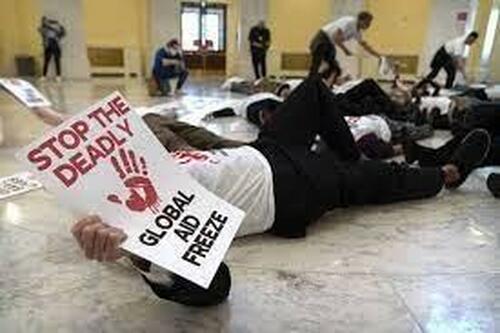Federal Government Returns To US Supreme Court In Push To Freeze $12 Billion In Foreign Aid
Authored by Melanie Sun via The Epoch Times,
The federal government on Aug. 26 filed an application with the U.S. Supreme Court seeking to suspend a court order that is preventing it from freezing billions in foreign aid.
President Donald Trump, on inauguration day, ordered a 90-day pause on all foreign aid.
His presidential order was met with legal challenges from two nonprofit groups that receive federal funding grants related to aid: the AIDS Vaccine Advocacy Coalition and Journalism Development Network.
They alleged that Trump’s funding freeze was unlawful.
The order directed federal agencies to “immediately pause new obligations and disbursements of development assistance funds to foreign countries and implementing non-governmental organizations” while the newly elected administration reviewed the programs to see if they were consistent with its America First foreign policy objectives.
Secretary of State Marco Rubio then outlined in a memorandum that he was freezing foreign-aid programs funded by the State Department and the U.S. Agency for International Development (USAID). The AIDS Vaccine Advocacy Coalition and Journalism Development Network were among those granted money from this pool of funding.
In an emergency filing, U.S. Solicitor General D. John Sauer of the U.S. Department of Justice said on Aug. 26 that the administration’s position to overturn a federal court injunction had been supported 2–1 by the panel of the U.S. Court of Appeals for the District of Columbia Circuit earlier this month.
Despite that ruling, the injunction by a lower court remains in effect after U.S. District Judge Amir Ali in Washington on Aug. 25—and the federal appeals court last week—rejected the Justice Department’s request to put it on hold.
“The government is thus forced to ask this Court to give effect to the D.C. Circuit’s decision, which correctly held that private parties cannot enlist Article III courts to supplant the interbranch dialogue regarding the expenditure of appropriated funds,” Sauer said in his 36-page application to the Supreme Court.
The funds subject to the injunction comprise tens of billions of dollars, some $12 billion of which would need to be spent by the U.S. Department of State before Sept. 30, when they expire, according to the filing.
Without the court’s intervention, Sauer said, the State Department will be bound by the injunction to keep making the foreign aid payments before the expiry date.
The injunction “will effectively force the government to rapidly obligate some $12 billion in foreign-aid funds that would expire September 30 and to continue obligating tens of billions of dollars more—overriding the Executive Branch’s foreign-policy judgments regarding whether to pursue rescissions and thwarting interbranch dialogue,” Sauer said.
Disputes between the legislative and executive branches over federal funding have historically been determined through the political process, as codified by the Impoundment Control Act of 1974 (ICA).
“Yet the district court jumped ahead, appointing itself as overseer of spending decisions and allowing private parties to bring suits without regard to the Comptroller General or Congress’s views,” Sauer said.
The lower court decision effectively ruled that such private parties “could persuade district courts to superintend the Executive Branch’s disbursement of funding streams and second-guess the political branches’ views of the ICA,” the filing said.
Sauer said the plaintiffs face no irreparable harm from the federal government’s decision to freeze funding.
“They cannot claim irreparable harm from the unavailability of certain funding streams when they have no entitlement to those funds anyway,” the petition said.
“They simply want to compete for foreign-aid awards. But even under the injunction, they have no guarantee of getting a penny, making it all the more incongruous for them to effectively commandeer the spending of billions of dollars.”
The U.S. Supreme Court declined on March 5 to intervene after Ali ruled against the administration on Feb. 25.
The Supreme Court at the time asked Ali to “clarify what obligations the Government must fulfill to ensure compliance” with his temporary restraining order.
Ali then determined it was likely the Trump administration was acting beyond its purview by canceling funds earmarked by Congress, and barred it from “unlawfully impounding congressionally appropriated foreign aid funds.”
The DOJ appealed, and the three-judge appeals panel stayed Ali’s order. The plaintiffs then appealed to the full court of appeals, which has yet to make its decision but has left Ali’s injunction in place.
Sauer has asked for its petition to be addressed by Sept. 2 “due to the additional irreparable harms the government would incur past that point.”
“Backtracking on those commitments and proposing rescissions after September 2 would inflict irreparable diplomatic costs and generate needless interbranch friction,” he said.
Tyler Durden
Wed, 08/27/2025 – 15:00
Source link

















